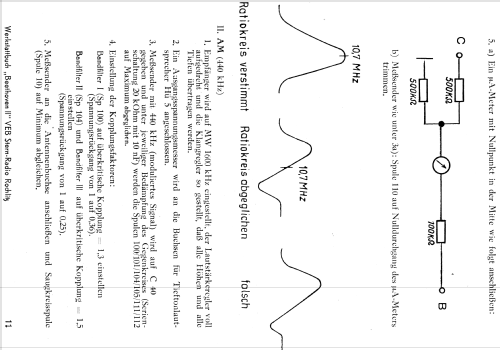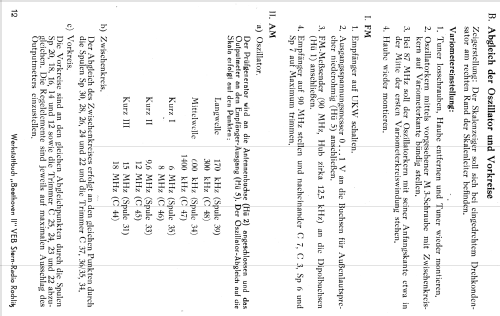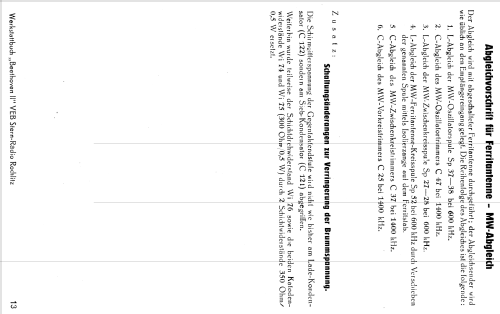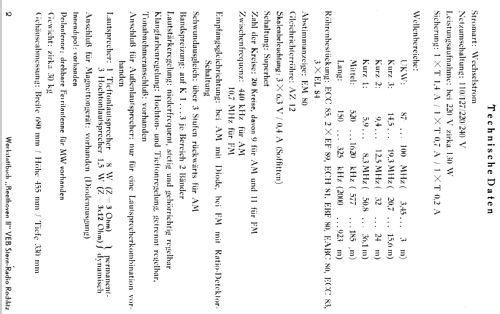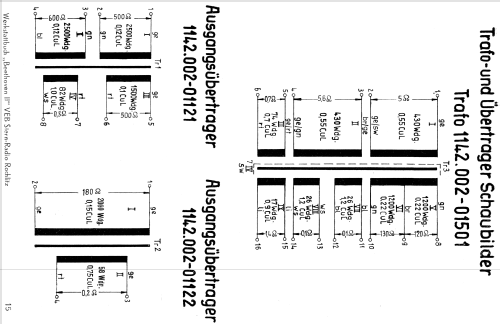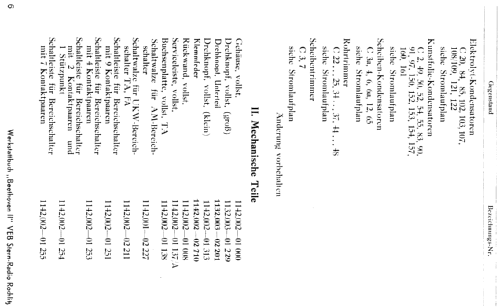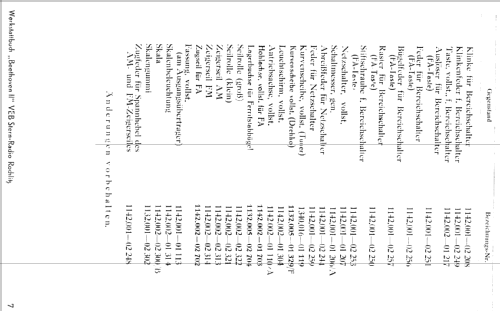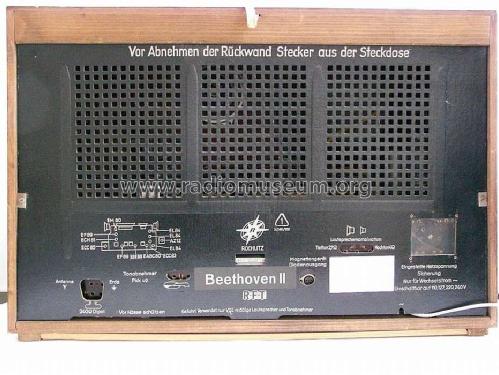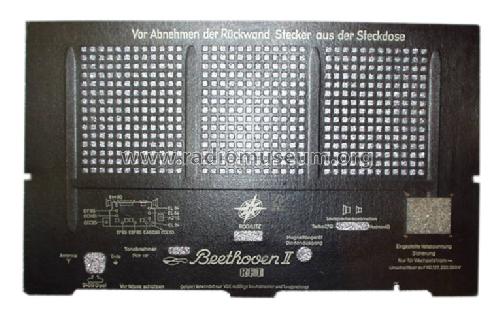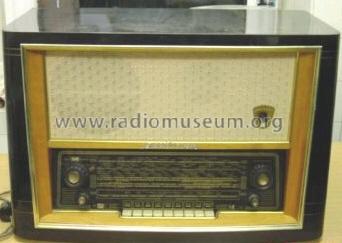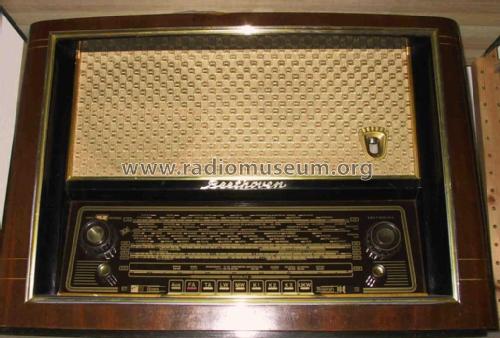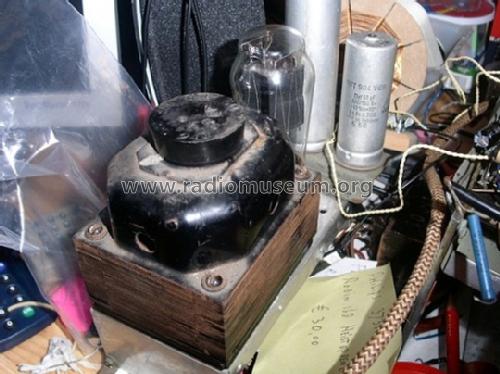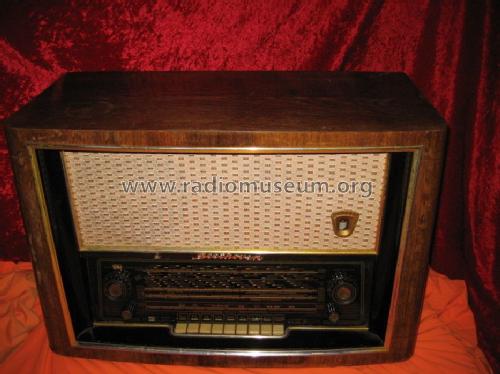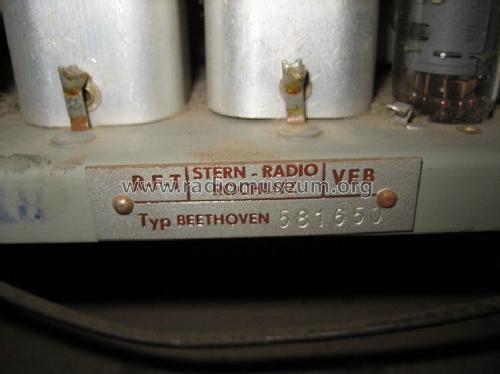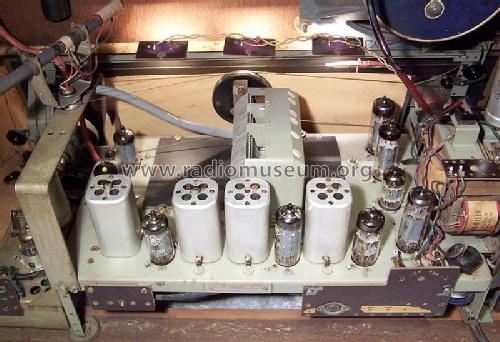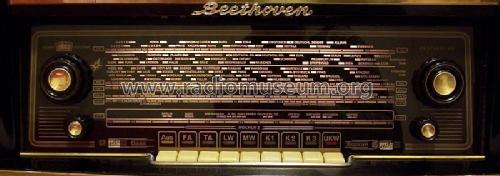Beethoven II (2) 1142.002 ab Ser.Nr.570001 Diskantschalter am Höhenregler (Sopran)
Stern-Radio Rochlitz, VEB, RFT, (Ostd.) - vorm. Graetz AG
- Paese
- Germania
- Produttore / Marca
- Stern-Radio Rochlitz, VEB, RFT, (Ostd.) - vorm. Graetz AG
- Anno
- 1956/1957
- Categoria
- Radio (o sintonizzatore del dopoguerra WW2)
- Radiomuseum.org ID
- 16694
Clicca sulla miniatura dello schema per richiederlo come documento gratuito.
- Numero di tubi
- 12
- Principio generale
- Supereterodina con stadio RF; ZF/IF 440/10700 kHz
- N. di circuiti accordati
- 9 Circuiti Mod. Amp. (AM) 11 Circuiti Mod. Freq. (FM)
- Gamme d'onda
- Onde medie (OM), lunghe (OL), piú di 2 gamme di onde corte (> 2 x OC) e MF (FM).
- Tensioni di funzionamento
- Alimentazione a corrente alternata (CA) / 110-240 Volt
- Altoparlante
- 4 altoparlanti
- Potenza d'uscita
- 8 W (qualità ignota)
- Materiali
- Mobile in legno
- Radiomuseum.org
- Modello: Beethoven II 1142.002 ab Ser.Nr.570001 [Diskantschalter am Höhenregler ] - Stern-Radio Rochlitz, VEB, RFT
- Forma
- Soprammobile con pulsantiera/tastiera.
- Dimensioni (LxAxP)
- 655 x 455 x 325 mm / 25.8 x 17.9 x 12.8 inch
- Annotazioni
- Diskantschalter am Höhenregler (Sopran), keine eigene Diskanttaste. Kurzwelle auf 3 Bereiche je 2 Bänder gespreizt.
- Peso netto
- 22 kg / 48 lb 7.3 oz (48.458 lb)
- Prezzo nel primo anno
- 918.00 DM
- Fonte esterna dei dati
- E. Erb 3-907007-36-0
- Fonte dei dati
- Radiokatalog Band 2, Ernst Erb
- Letteratura / Schemi (1)
- -- Original-techn. papers.
- Bibliografia immagini
- Das Modell ist im «Radiokatalog» (Erb) abgebildet, das Copyright liegt beim Deutschen Rundfunk Museum (DRM), Berlin und beim Archiv-Verlag (AV). Sie finden eine grössere Abbildung und Schaltbild etc. bei der Loseblatt-Sammlung von DRM/AV.
- Altri modelli
-
In questo link sono elencati 113 modelli, di cui 104 con immagini e 88 con schemi.
Elenco delle radio e altri apparecchi della Stern-Radio Rochlitz, VEB, RFT, (Ostd.) - vorm. Graetz AG
Collezioni
Il modello Beethoven II (2) fa parte delle collezioni dei seguenti membri.
Discussioni nel forum su questo modello: Stern-Radio Rochlitz: Beethoven II 1142.002 ab Ser.Nr.570001
Argomenti: 4 | Articoli: 13
Dear Guests
I’m trying to restore a Stern-Rochlitz Beethoven 1, with IL taste.I’ve bought the radio in Germany, and it arrived here already restored in the electronic side.
All power supply eletrolithics, non electrolitics capacitor had been replaced by someone with new ones.
It seems that the restoration has been made up well: the reception is very good, with high sensitivity and strong adjacent channel rejection,
Unfortunately both with FM and CD in, at medium/high volume, I hear a too strong bass presence, with low frequency very distorced and “woofing”,
This makes the listening impossible, because the basses are very distorced.
I’ve tried to change all the capacitor in the feedback final stage with new ones. I tried to change the two EL84 for medium-low frequency circuit branch, and the ECC83
but the result is the same. I can’t imagine that this radio should play in that horrible way...
May You kindly help me?
Cordially
Riccardo
Riccardo Coradazzi, 30.Jun.10
I needs ito know the scheme of the tuning FM ropes because it lacked and I have some difficulty to reconstruct the exact scheme.
For to be correct the rope always exits from the guide A and I don't know if the guide B was used?
Someone can help me?
Thanks Giovanni - Venice
Allegati
- Guide A (101 KB)
- Guide B (83 KB)
- Left side Rope (112 KB)
Giovanni Saoner, 14.Jun.07
Hallo Radiofreunde,
ich suche den Seillaufplan (AM+FM) für dieses Gerät möglichst aus den original - Werkstattbuch.
Kann jemand helfen?
Sehr interessant ist die mechanische Realisierung des Duplexantriebes. Eine Kupplung verbindet jeweils den AM- oder FM- Antrieb über eine dünne Gummischeibe ohne jegliches Spiel oder Schlupf. Der Anpressdruck wird über federnd in der Antriebswelle sitzender Kugeln realisiert. So wird ein überaus sanftes Umschalten der Antriebe erreicht, wobei nicht die geringste Verstellung der jeweiligen Einstellposition der Senderwahl eintritt.
Auch das Skalenseil wird über Seilrollen, welche an einem federnd gelagerten Arm montiert sind, permanent gespannt. Eine aufwendige Konstruktion in einem Spitzengerät der DDR-Produktion aus den Jahre 1956.
Vielen Dank für die Mühe und Hilfe!
Jens Dehne
Jens Dehne, 01.Mar.05
Das Chassis des Beethoven wurde in die Rafena Fernsehtruhe "Clivia II" und in den Fernsehmusikschrank "Cabinet " eingebaut.
Die Ausführung der Typen:
Clivia II
Fernsehchassis FE 855 mit 43cm Bildröhre, Rundfunkgerät " Beethoven" mit Originallautsprecherkombination bestehend aus einen Tiefton-,einem Hochton- und zwei Mitteltonlautsprechen
Cabinet
Fernsehchassis FE 855 mit 53cm Bildröhre Rundfunkteil "Beethoven", Tonbandgerät "Smaragd BG20" und Plattenspieler für 78,45 und 33 Umdrehungen Typ "Zittau 8422.10/10. Die Cabinet-Truhe ist mit 6 Lautspechern jeweils 2 Mittelton- Hochton- und Tiefton bestückt.

Bildbreite korrigiert
Jörg Kulbe, 27.Jun.04



